Hack Chinese App Review // Spaced Repetition At It’s Best

Language learning is one of those fields that sometimes feels like it is still living back in the “cocaine toothache drops, for sale by all druggists” heady era of unrepentant quackery.
From beliefs that adults can simply learn a foreign language by osmosis and courses that’ll have you speaking like a native in thirty days, to some people’s very avant-garde interpretation of the word “fluent”, it’s no wonder most people who start give up pretty soon after.
There is no magic app or book that’ll explain everything you need to know about a language and it also doesn’t help when people say things like “oh yes I lived in Hungary for two months and just picked it up” because they are lying.
Which leads us to one of the great contentious issues in language learning: the bulk memorisation of vocabulary.
Among some people, using flashcard-based tools to memorise vocab is akin to summoning beelzebub in a fit of rage after discovering your ex is engaged to that one girl he’d always denied having feelings for.
It’s part of this trend away from rote memorisation in languages in favour of a holistic approach where you open your chakras and vocabulary flows in freely from the mouth of the much sought-after species known as the “native speaker”.
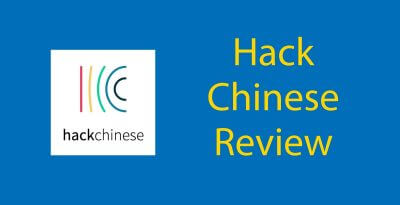
The holistic approach is fine so long as you’re willing to abandon this idea that adults can learn languages like babies (whatever the science behind it, it’s just not practical).
Immersion and getting the opportunity to use a language with native speakers is even better.
But at some point you’re going to have to sit down and memorise vocab.
This doesn’t necessarily (and probably shouldn’t) mean long lists of random words, but it makes sense to learn the words you’ve picked up in class or while chatting with people, even if cramming them into your brain bag isn’t the “natural” way to do it.
And for Chinese this is an absolute pain in the gulliver because there’s so much to remember.
When it comes to memorising vocabulary, all-purpose software for languages such as Memrise and Quizlet just aren’t quite built for non-alphabetical languages.
As scary as Russian might look to the English speaker, once you’ve got the Cyrillic alphabet down you’re cruising. But for character-based languages it’s that bit harder.
It’s like trying to make a flashcard with three sides. For Mandarin you need to remember not just the word and definition but the character, pronunciation and definition.

A Beginner’s Guide to Chinese Calligraphy
Chinese calligraphy, or 书法 (shūfǎ), is an ancient art form dating back as early as around 200 BCE. Learn everything you need to know with our guide.
Over the years, I have tried to come up with various ways to get around this without going down the sacrilegious route of deciding characters aren’t that important.
For a while, I used two vocab lists on Memrise, one for the character and definition, another for the character and pronunciation.
This required having to make my own lists, which for HSK 4 was a Herculean task.
Apart from the dozens of hours it took to make them, it wasn’t a very elegant solution. It was also demotivating because it felt like twice the work for some strange reason.
To this day, I don’t know how it ended up that one list had five more words than the other.
For HSK 5 vocab, I decided two lists was too much in terms of pure man hours putting them together so tried to combine them.
Therefore, for each definition on Memrise, I had to type the definition in one column and then the character and the pinyin with numbers after each to indicate the tones in the second. After about adding two hundred words or so, I gave up.
Then I came across Hack Chinese, which I was really sceptical about to begin with for reasons I will explain, on a friend’s LinkedIn.
It had a twenty day trial so thought I’d give it a shot.
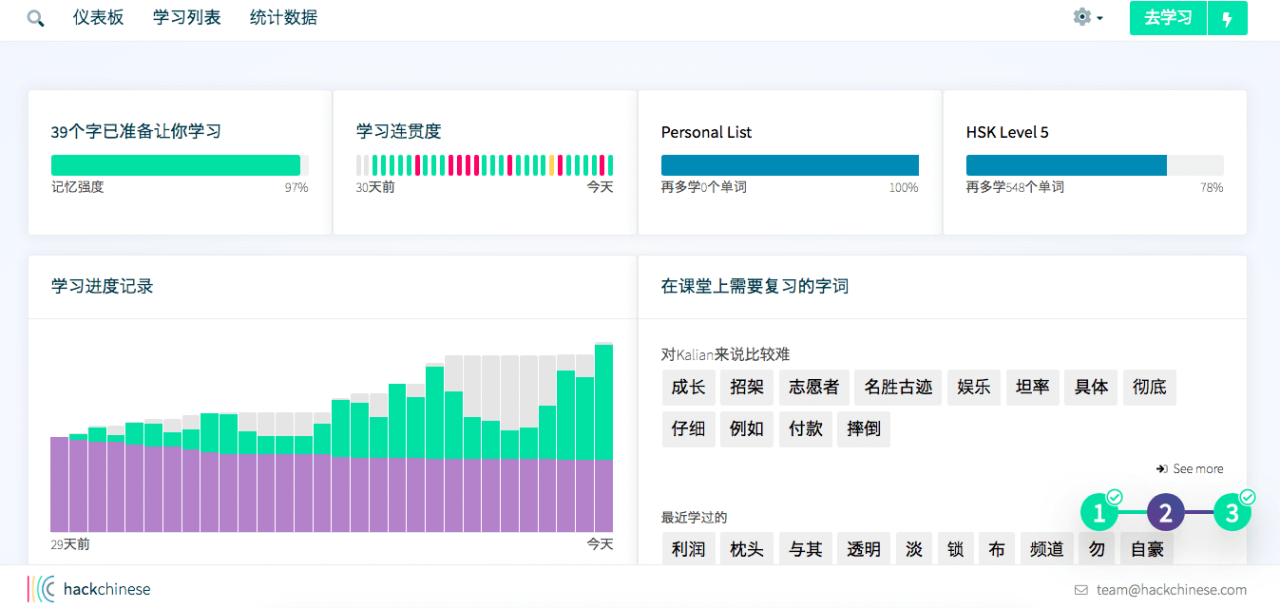
Delving into Hack Chinese
Hack Chinese has a fairly simple interface, complete with a night mode that gives off major supervillain vibes and a choice between everything being in English or Chinese.
But what sets it apart from other flashcard software is the beautiful, beautiful data everywhere.
It tells you all about your study habits using graphs and percentages and numbery things.

It could be latent narcissism, but somehow being able to chart how much I’d learned was motivating.
From the homepage you can check out your study patterns over the last few weeks, see how often and how much you are learning and even check out what percentage of your vocab lists are complete.
Hack Chinese gives you averages and charts and red bars of shame on days you don’t study, which is somehow less stressful than the prospect of knowing you are going to make a little green owl cry if you don’t learn how to say “the dog is on the cat” in High Valyrian.
The program supplies a few pre-prepared vocab lists for specific textbooks, exams and topics and then there’s a personal list for your own words.
Hands down one of the best things about this is that you don’t repeat the same words added to different lists. So if you learn a word in your personal list that is also on say an exam prep list it’s automatically marked off.
Like any decent flashcard software, there’s spaced repetition for refreshing your memory and settings for learning preferences.
There are also a few nifty tricks it has that other flashcard programs don’t.
For example, if you start learning HSK 5 vocabulary, it’ll throw in a few lower-level words it assumes you know just to see the look on your face when you realise you’ve been using the wrong tone for 二 longer than Xi Jinping has been in charge.
Honesty is the Best Policy
The thing about Hack Chinese is that it only works if you are honest with yourself.
You get shown characters and have to press right arrow if you know it and left if you don’t, first for the pinyin and tone and then the definition.
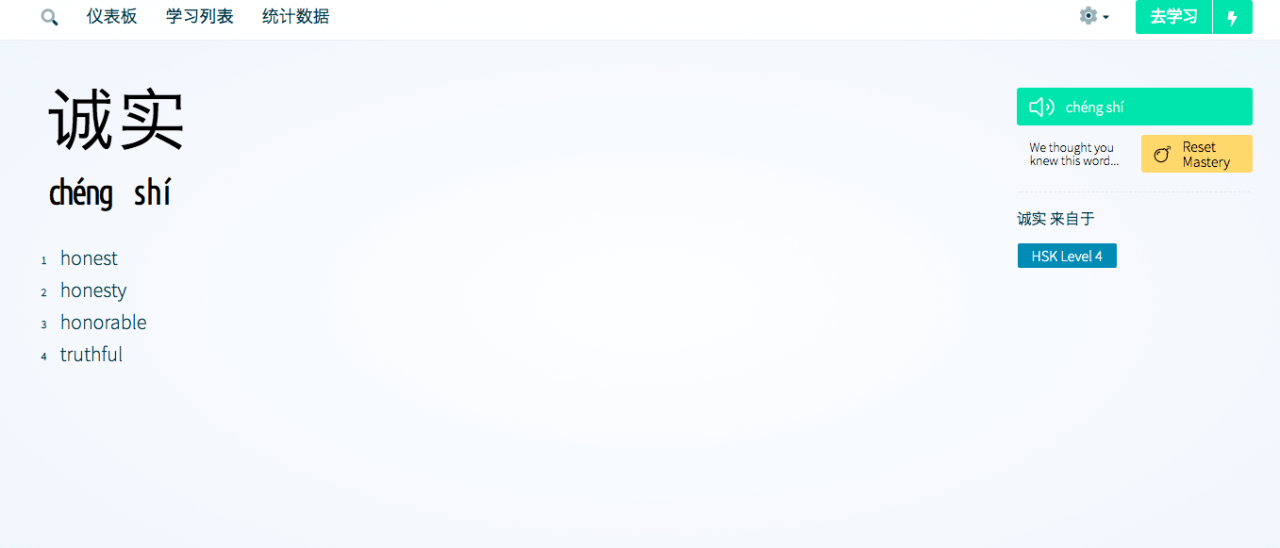
I regularly convince myself that everything is fine and we’re not living in the darkest timeline, and that my clothes continuously shrinking in the wash has nothing to do with my tub-a-week mayonnaise addiction.
Yet I’m expected to be honest with myself about whether I knew the answer to a really hard word knowing that if I admit I don’t know I’ll be confronted by it again in about thirty seconds.
I therefore gave up because I thought this was a stupid way of doing things. Then I gave it another shot and realised it was brilliant.

Become A Dianping Master // 8 Amazing Tips You’ll Never Forget
Dianping might seem scary at first with Mandarin everywhere you look. We’ve therefore complied this super-simple guide to becoming a master in minutes.
My other issue with using platforms like Memrise was that I didn’t feel like I was actually learning the vocabulary.
I would basically wake up in the morning to see all these wilting memory flowers and just want to get watering them over and done with.
My lazy-arse brain knew that the quicker I got through the vocab, the quicker the ordeal ended.
It did everything it could to sabotage my vocab learning. It’s a problem that proponents of gamified education still need to find a way around.
People’s brains hate them and their hopes and dreams and are much more interested in beating the game than learning.
For example, if I knew one word had a fairly lengthy definition, I would select the biggest multiple-choice box as soon as it appeared because that was probably it. Other times, I would only read the first character and pick it, or just go for the only one-character word.
There was no incentive really not to do this other than the fact that it would be for my own good.
With Hack Chinese, being forced to be honest meant I ended up saying each word aloud to make sure I knew the pronunciation.
It felt too weird to just think it in my head. Doing this had the added benefit of leading me on a weekend-long quest for improved pronunciation that resulted in learning what retroflex consonants are (which feels like it was something I should have learned in lesson one of Mandarin but hey).
Short & Snappy
The other thing Hack Chinese has going for it is that sessions are timed rather than being based on getting through a certain amount of vocab, which removes the incentive to rush.
It’s like being told to either do twenty push-ups or do push-ups for one minute.
Not that I have ever done either, but I imagine in the former you’re gonna rush because it hurts like heck. In the latter you’re in agony until that minute is up so you may as well take some time to work on your form.

What Could Be Improved?
There are a few things that could be improved.
You’re going to have a hard time if your Chinese learning goals involves vocabulary from the “Niubi: The Real Chinese You Were Never Taught in School” or slang.
If it doesn’t turn up in their dictionary, you ain’t learning it as far as I can tell, though there is an option to flag your search to the company.
It’s not like they’re missing major vocabulary so mostly it’s not a huge issue but on a couple of occasions I searched for words that didn’t come up.
In 29 days I picked up two errors, one of which was listing 使劲儿’s definitions as “erhua variant of 使劲” which wasn’t helpful.
The other error was much more amusing: “chicken meat” was listed as a body part in one of the catalogue lists, likely having been confused with “muscle” as it sounds the same (in Chinese of course, clearly not in English).
In terms of the audio, on occasion it’s a bit bumpy but mostly no problem. The most major downside of the app overall is it’s currently computer-based and there isn’t a phone version.
The team at Hack Chinese did however recently add a traditional Chinese version for those who feel this year hasn’t been tough enough already.
Job Well Done
It seems unlikely in the near future I will be switching back to other platforms.
As much as I dislike saying nice things about others, they’ve done a really good job here.
I believe that to the point that I bought a year subscription in order to use Hack Chinese to fight the force of evil that is the HSK 5 Vocab list.
That concludes Callan’s Hack Chinese Review… but wait!
Speaking of HSK – we’ve got another app for you if that floats your boat – HSK Online.
Hack Chinese Review || FAQs
What is Hack Chinese?
Hack Chinese is a great way to memorise and learn Chinese vocabulary using short, snappy study sessions.
Is Hack Chinese free?
For 20 days yes, then if you like it, you can purchase a monthly/yearly membership.
Does Hack Chinese have an app?
Currently no, you use Hack Chinese in browser.
Want more from LTL?
If you wish to hear more from LTL Mandarin School why not join our mailing list.
We give plenty of handy information on learning Chinese, useful apps to learn the language and everything going on at our LTL schools!
Sign up below and become part of our ever-growing community!

 Hi, my name is Mojca. I am from Slovenia in Europe and I work as a student advisor at our Beihai school.
Hi, my name is Mojca. I am from Slovenia in Europe and I work as a student advisor at our Beihai school.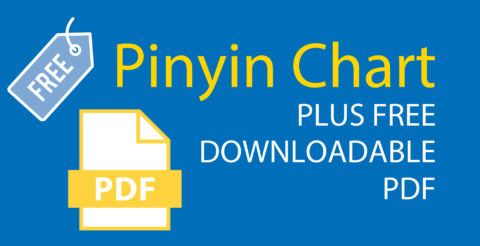



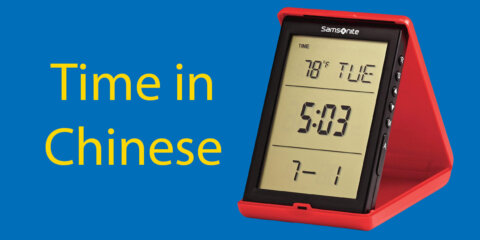

4 comments
[…] Check out our Hack Chinese Review […]
Does Hack Chinese have an App? If so, where can I download it from? Thank you
Hack Chinese isn’t actually an app – you do not download it via the Apple Store or Google Play. You use it through your web browser.
LTL
[…] With the wide range of stats, graphs and numbers available, it’s cool to see your progress on … […]